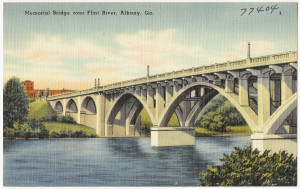In New York High Court Gives the Bronx Cheer to Insurers’ Pro Rata Allocation and Exhaustion Arguments, Pillsbury attorney Benjamin D. Tievsky discusses New York State Court of Appeals’ decision in In re Viking Pump, Inc. The Court of Appeals accepted two certified questions from the Delaware Supreme Court. As noted by Ben, “in a New York minute,” the Court of Appeals has “leveled the playing field by endorsing the ‘all sums’ and ‘vertical exhaustion’ approach to allocation advocated by a policyholder, at least as to policies containing ‘non-cumulation’ and ‘prior insurance’ provisions.” This ruling will be of interest to those who have encountered in New York barriers to insurance coverage where multiple policies over multiple policy terms are implicated, including, but not limited to, coverage for environmental or asbestos liabilities.
In NY, what is a “elevation-related hazard?”
Roughly two weeks before annual National Stand-Down Week (May 2-6), New York’s Appellate Division,  Second Department, in Vitale v. Astoria Energy II, LLC, affirmed a trial court’s dismissal of a worker’s personal injury claim resulting from a fall at a construction site. Specifically, the Appellate Division held that Vitale failed to create an issue of fact as to whether an alleged dangerous condition on a construction project presented an elevation-related hazard in accordance with New York’s Scaffold Law – Labor Law §§ 240(1) and 241(6). Labor Law § 240(1) was designed to prevent elevation-related risks, and holds owners and contractors absolutely liable (without consideration of the worker’s comparative fault) in the event of a statutory violation that causes an elevation-related injury. Labor Law § 241(6) imposes vicarious (but not absolute) liability upon owners and contractors for a violation of the Industrial Code that causes a worker’s injury, but allows consideration of comparative negligence.
Second Department, in Vitale v. Astoria Energy II, LLC, affirmed a trial court’s dismissal of a worker’s personal injury claim resulting from a fall at a construction site. Specifically, the Appellate Division held that Vitale failed to create an issue of fact as to whether an alleged dangerous condition on a construction project presented an elevation-related hazard in accordance with New York’s Scaffold Law – Labor Law §§ 240(1) and 241(6). Labor Law § 240(1) was designed to prevent elevation-related risks, and holds owners and contractors absolutely liable (without consideration of the worker’s comparative fault) in the event of a statutory violation that causes an elevation-related injury. Labor Law § 241(6) imposes vicarious (but not absolute) liability upon owners and contractors for a violation of the Industrial Code that causes a worker’s injury, but allows consideration of comparative negligence.
It’s Time for a Toolbox Talk
Join in the National Safety Stand-Down May 2-6, 2016. The purpose of the stand-down is to raise awareness about preventing fall hazards in the construction industry. Fatalities caused by falls from elevation continue to be a leading cause of death for or serious injury to construction workers. The U.S. Department of Labor, Occupational Safety & Health Administration’s (OSHA) goal is to reach 5 million workers, which is more than more than half of the construction workers in the U.S. To participate in the safety stand-down, a company can host a voluntary event to talk directly to employees about safety. The event doesn’t have to be formal. Companies are encouraged to adopt a stand-down plan approach that works best for their workplace, including, for example, safety activities such as safety equipment inspections, developing rescue plans, or discussing job specific hazards. It can even take the form of a “toolbox talk.”
Additional Source: Evento nacional destacará importancia de la prevención contra las caídas: primera causa de muerte y lesiones graves en industria de la construcción; Suggestions to Prepare for a Successful Stand-Down; Stand Up For Safety, Join in the Safety Stand-Down June 2 – 6
Attention Home Improvement Contractors: CA Bill Singles Out Solar Contractors
California Assembly Bill 2699 (Gonzalez) is a bill to watch if you are a home improvement contractor that  installs solar energy systems or, for that matter, a contractor in California. AB 2699 would, among other things, require the Contractors State License Board (CSLB) to develop a “solar energy system disclosure document” and, in turn, require solar energy systems companies to provide this document to its customers prior to the completion of a sale, financing, or lease of a solar energy system.
installs solar energy systems or, for that matter, a contractor in California. AB 2699 would, among other things, require the Contractors State License Board (CSLB) to develop a “solar energy system disclosure document” and, in turn, require solar energy systems companies to provide this document to its customers prior to the completion of a sale, financing, or lease of a solar energy system.
AB 2699 would also require the CSLB to establish through regulation requirements for a contractor to maintain a blanket performance and payment bond for the purpose of solar installation work and, of particular note, even with this bond, the contractor will be subject to the down-payment restriction set forth in California Business & Professions Code § 7159.5(a)(8). If this bill is signed into law, this latter requirement will certainly translate into increased costs for contractors that currently do not have in place a blanket performance and payment bond. In turn, as a practical matter, this lIsley will translate into higher costs for consumers who want to install a solar system because such costs will trickle down to them. There may also be pressure put on others in the industry to reduce costs to make up for this increase in costs.
Something in the Water: Flint Judge Disqualifies Himself and Staff as Theoretical Plaintiffs
In late April, U.S. District Court Judge Mark A. Goldsmith, in Concerned Pastors for Social Action, et al. v. Nick A. Kouri, et al.,  issued an interesting Order Regarding Disqualification. During an April 6, 2016 status conference in this matter, the Court to the parties “information regarding its consumption of water whose source was the Flint River, during the period of April 2014 to August 2014, a time period when its duty station was at the Flint Divisional courthouse.” On the same day, the Court issued an order instructing “the parties to file any objections pertaining to the Court’s continued participation in the matter.” At issue was Title 28 U.S.C. § 455(a), which provides that any judge “of the United States shall disqualify himself in any proceeding in which his impartiality might reasonably be questioned.”
issued an interesting Order Regarding Disqualification. During an April 6, 2016 status conference in this matter, the Court to the parties “information regarding its consumption of water whose source was the Flint River, during the period of April 2014 to August 2014, a time period when its duty station was at the Flint Divisional courthouse.” On the same day, the Court issued an order instructing “the parties to file any objections pertaining to the Court’s continued participation in the matter.” At issue was Title 28 U.S.C. § 455(a), which provides that any judge “of the United States shall disqualify himself in any proceeding in which his impartiality might reasonably be questioned.”
Obtaining Insurance Coverage for Climate Change Investigations
UPDATE: When Attorneys General Attack II
In When Attorneys General Attack, Pillsbury attorneys Sheila McCafferty Harvey, Joseph Jean, Carolina Fornos and Benjamin Tievsky discuss the New York State Office of the Attorney General’s and other jurisdictions’ power to aggressively scrutinize energy companies’ public statements on the subject of climate change. In the alert, they provide strategies for managing and obtaining insurance coverage for these investigations.
CGL Policy Double Standard for Construction Defects
In A Double Standard in Construction Defect Coverage Cases?, I discuss the recent decision of Allied Property & Casualty Insurance Co. v. Metro North Condominium Associates. This decision highlights why only a minority of courts still hold to the fiction that construction defects cannot give rise to an “occurrence” covered under a commercial general liability (CGL) policy, why construction companies and others need to understand how this rule is applied, and why contractors may want to avoid choosing Illinois law to control their CGL policy.
10th Circ.: Permit Issuance Is Not State Action for Purposes of 14th Amendment
 On April 19, 2016, the U.S. Court of Appeals for the Tenth Circuit, in Wasatch Equality, et al., v. Alta Ski Lifts Company, et al., affirmed the lower court’s dismissal of a lawsuit claiming that the U.S. Forest Service, in routinely approving a permit to operate the Alta Ski area in Utah, unconstitutionally discriminated against a group of snowboarders who were banned from using these ski lift facilities by an edict of the ski resort’s operators. Ultimately, the Court of Appeals concluded that “[e]ven if we grant all reasonable inferences in Wasatch’s favor, the pleaded facts at best establish that each year the Forest Service—with knowledge of the snowboard ban—reviews and approves Alta’s site plan and receives from Alta a usage fee. This isn’t enough to establish state action for purposes of the Fourteenth Amendment.”
On April 19, 2016, the U.S. Court of Appeals for the Tenth Circuit, in Wasatch Equality, et al., v. Alta Ski Lifts Company, et al., affirmed the lower court’s dismissal of a lawsuit claiming that the U.S. Forest Service, in routinely approving a permit to operate the Alta Ski area in Utah, unconstitutionally discriminated against a group of snowboarders who were banned from using these ski lift facilities by an edict of the ski resort’s operators. Ultimately, the Court of Appeals concluded that “[e]ven if we grant all reasonable inferences in Wasatch’s favor, the pleaded facts at best establish that each year the Forest Service—with knowledge of the snowboard ban—reviews and approves Alta’s site plan and receives from Alta a usage fee. This isn’t enough to establish state action for purposes of the Fourteenth Amendment.”
San Francisco: First City to Require Fully Paid Parental Leave
In New Legislation Makes San Francisco the First City to Mandate Fully Paid Parental Leave for Employees, Pillsbury attorneys Paula Weber and Erica Turcios discuss the San Francisco Board of Supervisors’ unanimous approval of legislation that requires most San Francisco employees to receive six weeks of fully paid parental leave. Enforcement is set to begin on January 1, 2017.
Texas Court of Appeals Issues Important State Superfund Order
In a “case of first impression,” U.S. Court of Appeals for the Third Circuit, sitting in Austin, in TCEQ v. Exxon Mobil Corporation, et al., issued an important decision interpreting the scope of the Texas Solid Waste Disposal Act (TSWDA) as it pertains to judicial review of and the burden of proof for certain administrative cleanup orders issued by the Texas Commission on Environmental Quality (TCEQ). In general, relatively few opinions have been issued interpreting the TSWDA, and in particular, Subpart F, which is the Texas counterpart to CERCLA (or Superfund) entitled “Registry and Cleanup of Certain Hazardous Waste Facilities.” Given the significance of this decision, an appeal to the Texas Supreme Court seems likely.
sitting in Austin, in TCEQ v. Exxon Mobil Corporation, et al., issued an important decision interpreting the scope of the Texas Solid Waste Disposal Act (TSWDA) as it pertains to judicial review of and the burden of proof for certain administrative cleanup orders issued by the Texas Commission on Environmental Quality (TCEQ). In general, relatively few opinions have been issued interpreting the TSWDA, and in particular, Subpart F, which is the Texas counterpart to CERCLA (or Superfund) entitled “Registry and Cleanup of Certain Hazardous Waste Facilities.” Given the significance of this decision, an appeal to the Texas Supreme Court seems likely.




